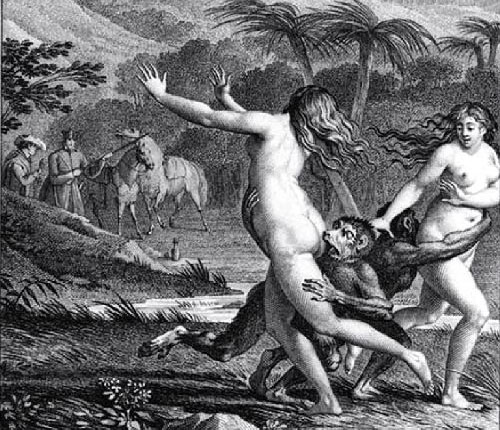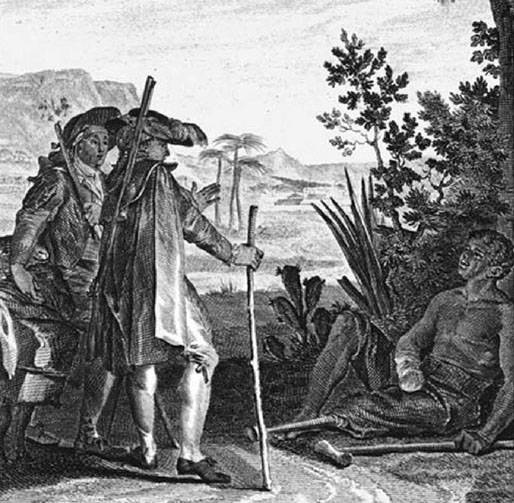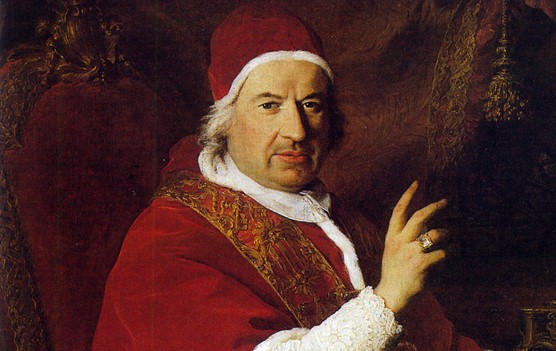French Enlightenment philosopher and writer, Voltaire, dedicated his career to criticizing the Catholic Church and organized religion. It could be said that he was an equal-opportunity offender regarding religion. His play Mahomet where he savaged the Prophet of Islam, was an indirect attack on the fanaticism of the Catholic clergy. All the learnt members of his society knew that he didn’t simply write a tragedy about an eastern religion which most French commoners on the streets would never have heard about any way. They understood that it was an attack in disguise against Christian fanatics. Despite Voltaire’s attempts to camouflage his criticism, it was still banned after only three performances in 1742. The ban lasted until 1751.
To get the ban reversed, Voltaire communicated with the highest authority in the Church. He sent Pope Benedict XIV an unctuous letter, full of fawning and grovelling, asking his permission to dedicate the play to him. He confirmed that his play is just about “the founder of a false and barbarous sect.” If you were the Pope, would you disagree? He ends it with “I kiss your sacred feet.”
MOST BLESSED FATHER,
Your holiness will pardon the liberty taken by one of the lowest of the faithful, though a zealous admirer of virtue, of submitting to the head of the true religion this performance, written in opposition to the founder of a false and barbarous sect. To whom could I with more propriety inscribe a satire on the cruelty and errors of a false prophet, than to the vicar and representative of a God of truth and mercy? Your holiness will therefore give me leave to lay at your feet both the piece and the author of it, and humbly to request your protection of the one, and your benediction upon the other; in hopes of which, with the profoundest reverence, I kiss your sacred feet.
Paris, August 17, 1745
Note: The letter above is available in French and original Italian at the end of this page.
The pope responded with a letter that starts with the following line:
A few weeks ago I was favored with your excellent tragedy of Mahomet, which I have read with great pleasure.
Voltaire was able to hit two birds with one stone: he’s now finally in the good books of the Church of Rome. He also got Rome to send orders to the Church of France to remove censorship on his play.
French version (translated):
TRÈS SAINT PÈRE,
Votre Sainteté voudra bien pardonner la liberté que prend un des plus humbles, mais l’un des plus grands admirateurs de la vertu, de consacrer au chef de la véritable religion un écrit contre le fondateur d’une religion fausse et barbare.
A qui pourrais-je plus convenablement adresser la satire de la cruauté et des erreurs d’un faux prophète, qu’au vicaire et à l’imitateur d’un Dieu de paix et de vérité ?
Que votre Sainteté daigne permettre que je mette à ses pieds et le livre et l’auteur. J’ose lui demander sa protection pour l’un, et sa bénédiction pour l’autre. C’est avec ces sentiments d’une profonde vénération que je me prosterne, et que je baise vos pieds sacrés.
Paris, 17 Auguste 1745
Original Italian:
BEATISSIMO PADRE,
La Santita Vostra perdonerà l’ardire che prende uno de’ più infimi fedeli, ma uno de’ maggiori ammiratori della virtù, di sottomettere al capo della vera religione questa opera control il fondatore d’una falsa e barbara setta.
A chi potrei più convenevolmente dedicare la satira della crudeltà e degli errori d’un falso profeta, che al vicario ed imitatore d’un Dio di verità e di mansuetudine ?
Vostra Santità mi conceda dunque di poter mettere a i suoi piedi il libretto e l’autore, e di domandare umilmente la sua protezione per l’uno, e le sue benedizioni per l’altro. Intanto profondissimamente m’inchino, e le bacio i sacri piedi.
Parigi, 17 Agosto 1745
The initial line of the Pope’s response translated to French:
Il y a quelques semaines qu’on me présenta de votre part votre admirable tragédie de Mahomet, que j’ai lue avec un très grand plaisir.
Original response in Italian (the first sentence) from Pope Benedict XIV
Settimane sono ci fu presentato da sua parte la sua bellissima tragedia di Mahomet, la quale leggemmeo con sommo piacere.
You might also like:

Candide: The shocking passages
Condemned by the French government and the Catholic Church: Read the controversial passages from Voltaire’s Candide (1759)
BOOK: CANDIDE

Voltaire’s radical views on race and slavery
Understanding Voltaire’s view on race and slavery through the eyes of Candide
BOOK: CANDIDE





